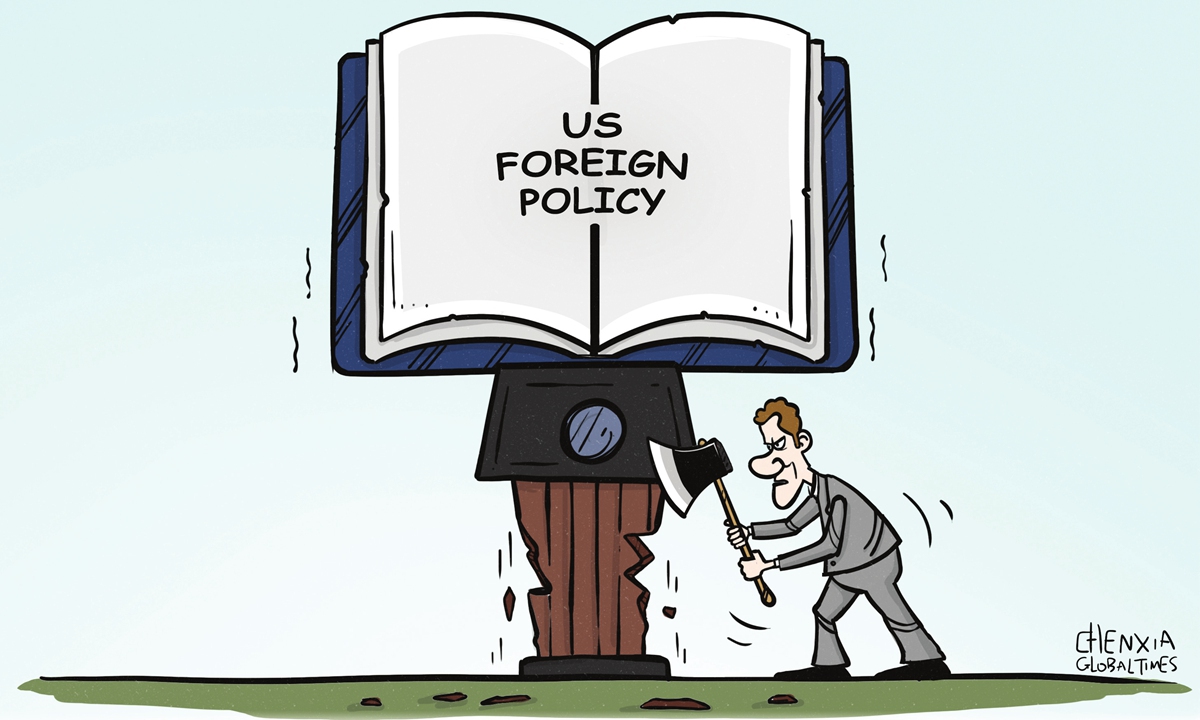
Illustration: Chen Xia/GT
Recently, officials of the Biden administration have frequently sent out signals to strengthen communication and resume dialogue with China. At the same time, US Congress has continued its consistent anti-China approach, intensively proposing a series of bills concerning the island of Taiwan, as well as sanctions against Chinese high-tech companies. This includes a bipartisan proposal dubbed the China Competition Bill 2.0. As the US pushes its policy toward China, the White House and Congress seem to be in a state of chaos.First, the US' China policy has shown and will continue to show the distinctive feature of being a result of weaponized legislation and the spillover effect of the country's domestic politics.
On China-related issues, particularly those revolving around the Taiwan island, the US Congress has made maximum use of its legislative function by frequently proposing, discussing and fully pushing several anti-China bills to finally become law. On issues related to the global economic and security order, it has always been the backbone of the US efforts to promote alliances. By using the law as a weapon, it continues to promote the goal of containing and suppressing China at the international level as well as dividing the world.
It is usually difficult to repeal bills after they become law, meaning that it is difficult for the US to make a major reversal of the current greatly intensified confrontation policy toward China. In the face of serious domestic rifts and sustained international pressure, Washington could hardly return to a rational and calm path that respects the sovereignty of China, or other countries.
Second, Congress has basically determined and dominated the main tone of the tough US' China policy.
Although the president of the US represents the country in foreign exchanges, the US Constitution divides foreign policy powers between the president and Congress. For a long time, some political elites have hyped that the checks and balances of different government departments are conducive to policy correction. Such an optimistic proposition has been repeatedly slapped in the face by reality. The White House fights with Congress for diplomatic power, leading to frequent major setbacks in US diplomacy.
In post-Cold War policy practice, fierce competition between Congress and the president over the dominance of who decides the US' China policy has not stopped. Over the past 30 years, the evolution of the US' policy toward China shows that the government has almost been downgraded to a follower, megaphone and executive agency of Congress. Since a group of hard-line US Congressmen actually dominates US' policy toward China, the White House's current "flexible" rhetoric toward China sounds more like diplomatic language.A more conservative and nationalist Congress is increasingly dominating the US' China policy. This has not only damaged the country's credibility and its president's diplomatic authority, but also made the US the biggest destructive factor in the evolution of the regional and even global order. It can be said that in the process of shaping US' policy toward China, this phenomenon of "Congressional tyranny" will not end in the short term, which is likely to hallow out the room for any goodwill the White House might have toward China.
Finally, the US' political elites lack a tradition of deep self-reflection, and their decision-making has fallen into a vicious circle of misjudgment of the external situation and frequent setbacks in foreign policy.
The American political elites arbitrarily and arrogantly uphold their own absolute superiority. This kind of political and decision-making culture often makes them habitually implement policies that will eventually lead to disastrous consequences in a way that is detached from domestic and international realities. The US' major key foreign policy decisions after the Cold War are a miserable record full of repeated misjudgments and failures, leading some American scholars to use the term "the blob" to describe the US policy elites who are narrow-minded, dangerous, and hard to change.
Indeed, US' foreign policy is actually being advanced according to existing historical inertia rather than calculated strategic planning. It is highly predictable and tragic. It is likely that the current panoramic new containment strategy implemented by the US against China will be the biggest diplomatic failure that the country will inevitably experience in the next 30 years.
In a nutshell, the current US' policy circles have different views on China. However, the focus is no longer on how to improve bilateral relations, but on how to marginalize China in a more economical and controllable manner. Washington's attempt to create a confrontational pattern between China and the US in the Asia-Pacific region will obviously arouse the vigilance and resistance of most regional countries, and it is doomed to fail.
The author is a professor at the Institute of International Relations of the China Foreign Affairs University. opinion@globaltimes.com.cn

